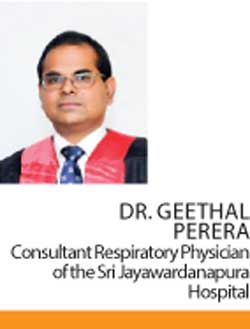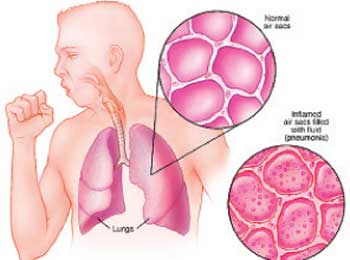10 Nov 2017 - {{hitsCtrl.values.hits}}
Pneumonia

 There are always many health hurdles to clear. Days set aside in the world to remind citizens of maladies is a great way to raise awareness against them. World Pneumonia Day falls on November 12, reminding us to strengthen our guard against Pneumonia. If medical attention is sought on time, pneumonia can be cured completely. If left untreated, it could be fatal. A cough or a cold doesn’t always signify a case of Pneumonia. It could also indicate other respiratory problems such as asthma or even bronchitis. So how do you know if you are suffering from pneumonia? Dr. Geethal Perera, Consultant Respiratory Physician of the Sri Jayawardanapura Hospital enlightened us on this subject during an interview done with Health Capsule.
There are always many health hurdles to clear. Days set aside in the world to remind citizens of maladies is a great way to raise awareness against them. World Pneumonia Day falls on November 12, reminding us to strengthen our guard against Pneumonia. If medical attention is sought on time, pneumonia can be cured completely. If left untreated, it could be fatal. A cough or a cold doesn’t always signify a case of Pneumonia. It could also indicate other respiratory problems such as asthma or even bronchitis. So how do you know if you are suffering from pneumonia? Dr. Geethal Perera, Consultant Respiratory Physician of the Sri Jayawardanapura Hospital enlightened us on this subject during an interview done with Health Capsule.
Simply put, Pneumonia is the inflammation of the lungs. “The respiratory system of our body consists of nose, throat, trachea, bronchi, lungs, etc. The disease affects air spaces in the lungs known as lung parenchyma,” said Dr. Perera. Pneumonia which starts in the lungs can give rise to sepsis affecting the blood, kidneys and other organs.
He said that infectious types of pneumonia are more common. “There are cases of Pneumonia that take place due to autoimmune diseases. But these cases of pneumonia are rare. Infectious cases of Pneumonia take place due to microbes such as viruses and bacteria. Other micro organisms such as fungi can cause pneumonia too,” explained Dr. Perera.
Viral Pneumonia
Viruses are a cause for Pneumonia. Influenza A viruses can lead to viral epidemics and during such plagues one has to take care. “There are many viral infections including influenza that don’t affect the lungs initially. So there is no cause to panic. But when viral pneumonia occurs, it damages the lungs, making it easy for other microorganisms such as bacteria to invade and multiply, thus aggravating the condition. This leads to drastic situations,” Dr. Perera further explained. The respiratory physician further indicated that care has to be taken especially during plagues when viral diseases such as H1N1 influenza spreads. This is because the immune system weakens, paving the way for micro organisms that cause pneumonia.
Bacterial Pneumonia
These cases of pneumonia are caused by bacteria. Dr. Perera said that the most common cause of Bacterial Pneumonia is the bacterium, Streptococcus. “These bacteria are naturally found in the upper respiratory tract such as the nose and the throat. They don’t cause harm under normal conditions. when people aspirate due to different reasons, throat secretions get into the lungs. The throat secretions will contain the Streptococcus bacteria as well. When they enter the lungs in large quantities, Pneumonia could occur . This is especially harmful for a person who has weak lungs.This is the most common form of bacterial Pneumonia,” he said.
According to Dr. Perera, environments in places like hospitals and ICUs contain many virulent and drug resistent microorganisms. These micro organisms when inhaled get colonized in the throat. These organisms can also cause harmful Pneumonia conditions.
Taking antibiotics irrationally will destroy the natural micro organisms in the throat. Thus the harmful micro organisms enter the lungs when aspirated. The Pneumonia condition caused this way is more severe
“Taking antibiotics irrationally will destroy the natural micro organisms in the throat. Thus the harmful micro organisms enter the lungs when aspirated. The Pneumonia condition caused this way could be difficult to treat,” said Dr.Perera.
Usually bacterial Pneumonia is acute, but in contradiction, tuberculosis is a condition that doesn’t infect a person acutely. “This means that your body won’t respond immediately to the micro organism causing tuberculosis, hence symptoms won’t appear immediately. Pneumonia due to Tuberculosis develops slowly over a long period of time,” he accentuated.
 Risk groups
Risk groups
Dr.Perera listed persons who have a higher tendency to contract Pneumonia. “patients with a tendency to aspirate such as stroke patients can fall victim to Pneumonia. Bed ridden patients who are unable to move are susceptible to hypostatic Pneumonia. Patients with immunosuppressive diseases are in the risk category as well. Due to their weak immunity, they can’t guard against lung infections and these could lead to Pneumonia. They include children in disadvantageous communities- who suffer from malnutrition and rheumatoid- arthritis patients, the elderly, HIV patients, kidney patients and patients who have undergone transplants. These patients should also take extra care,” he warned.
High fever with chills, shortness of breath, being lethargic, in the chest, an initial dry cough that develops in to a wet cough are some of the symptoms, according to Dr.Perera. Coughing out blood or pus is an immediate signal that you should consult your physician.
When to seek medical help
Dr. Perera added that the disease depends on the patient. “If a person is suffering from severe symptoms and is in the risk category, it is advised to seek medical attention within 3 days after observing the symptoms. If it is a patient who has undergone a transplant, the patient should seek help immediately within a day of experiencing the symptoms. If a healthy person suffers from symptoms of a common cold, such as a running nose, and if they aren’t short of breath, it is advised to take fluids and bed rest and observe whether the condition subsides. If it persists even after 3-5 days, it is advisable to consult a doctor who will assess the condition and provide appropriate treatment.Correct antibiotics should be started after proper assessment by a qualified doctor at the right time,” notified Dr.Perera. He also stated that there are cases where people suffer from coughs for more than 2 weeks, but assume it is just a cold and nothing severe. Unlike pneumonia, tuberculosis isn’t an acute disease. This could be a sign that you are suffering from tuberculosis, so seeking medical attention at the right time is important.
Diagnosis of the disease
A chest x-ray and blood test will be called for the purpose of diagnosis when coughing become persistent. The physician will look for any signs of pneumonia (or tuberculosis) using the x-ray. “In the case of bacterial pneumonia treatment and appropriate antibiotics will be prescribed. When pneumonia is diagnosed early hospitalization isn’t necessary, but that’s if the condition of the disease is uncomplicated. But follow ups are necessary to ensure the complete cure of the disease is achieved. More severe, complicated forms of Pneumonia will require hospitalization,”
he advised. Viral Pneumonia won’t respond to antibiotics. Drugs known as antiviral drugs are available in the treatment of Viral Pneumonia. A very few antiviral drugs are used to treat viral infections. “These drugs aren’t used commonly. If overused, the viruses become resistant to them as in the case of bacterial resistance development to antibiotics. They are issued to in-house patients in hospitals under a prescription. Anti viral drugs can’t be bought over the counter at pharmacies,”
Dr.Perera stressed.
 Prevention
Prevention
Some forms of Pneumonias are contagious. So preventing the spread of disease is important.
“Hand hygiene is vital. Wearing a mask is advised if you are suffering from a cough or cold. It prevents you from touching your face with hands soiled with bugs. After people blow their noses or rub their noses using their hands, they might touch their faces with these hands. This can spread the germs. The best method in preventing the spreading of a disease is to prevent others from catching your cold or cough as they are contagious. The contraction of these diseases could lead to Pneumonia in aggravated conditions with a weakened immunity. Avoiding alcohol and smoking is also advised.
Getting drunk tends to lead to aspiration which could cause Pneumonia,” he informed.
Pneumococcal vaccines are available. It is a preventive method. Patients suffering from long-term lung diseases and immune compromised patients- including patients under the risk groups- can receive vaccination on the recommendations of a consultant physician.
“Antibiotic abuse causes resistance in bacteria. Therefore taking antibiotics at initial stages of a disease without proper diagnosis can be harmful. This affects the natural microorganisms in the body, paving the way for harmful ones to enter the system that causes disease,” explicated Dr.Perera. After all, you may be suffering from just a cold and it may not be serious. All you may need is symptomatic treatment (excluding antibiotics) and bed rest.
“It is believed by many that having baths can cause pneumonia. This is completely false!!!,” concluded Dr.Perera.

23 Dec 2024 2 hours ago
23 Dec 2024 3 hours ago
23 Dec 2024 3 hours ago
23 Dec 2024 4 hours ago
23 Dec 2024 5 hours ago